Also known as “melon seed”, egusi refers to the oily seeds of Citrullus lanatus, a type of watermelon. However, it is cultivated mainly seeds as the flesh of the gourd is very dry and bitter. After the gourds are harvested, they are left to ferment and the seeds extracted and dried. It is then sold as it is or with the husks removed (manually or mechanically). Hand-shelled egusi is more sought after in Nigeria. Outside of Nigeria, egusi tends to be sold already husked (whole seeds) or ground.
It may be roasted and eaten as a snack but is mainly used as a thickener in soups, often mixed with leafy vegetables such as ugu, waterleaf, spinach and bitter leaf.
The seeds are also fermented to make ogili egusi which is used as a flavouring in soups cooked by the Igbos. Oil extracted from the seeds can be used in cooking or as a dip with boiled yam.
Store whole seeds in air-tight containers to keep out moisture and weevils. I tend to store mine in the freezer to be on the safe side. Ground egusi should be used as soon as possible as the oil content means it goes rancid very quickly (it should keep well in the freezer for a month or two).
Rich in nutrients, it comprises 30-40% cholesterol-free oil and about the same amount in proteins.
Substitute
Several people I know swear that ground almonds make a great substitute for egusi but I haven’t tried it yet, as it is very easy to find egusi in London. Besides, almonds are pretty expensive over here.

Ground & Whole Egusi
Leave a Reply